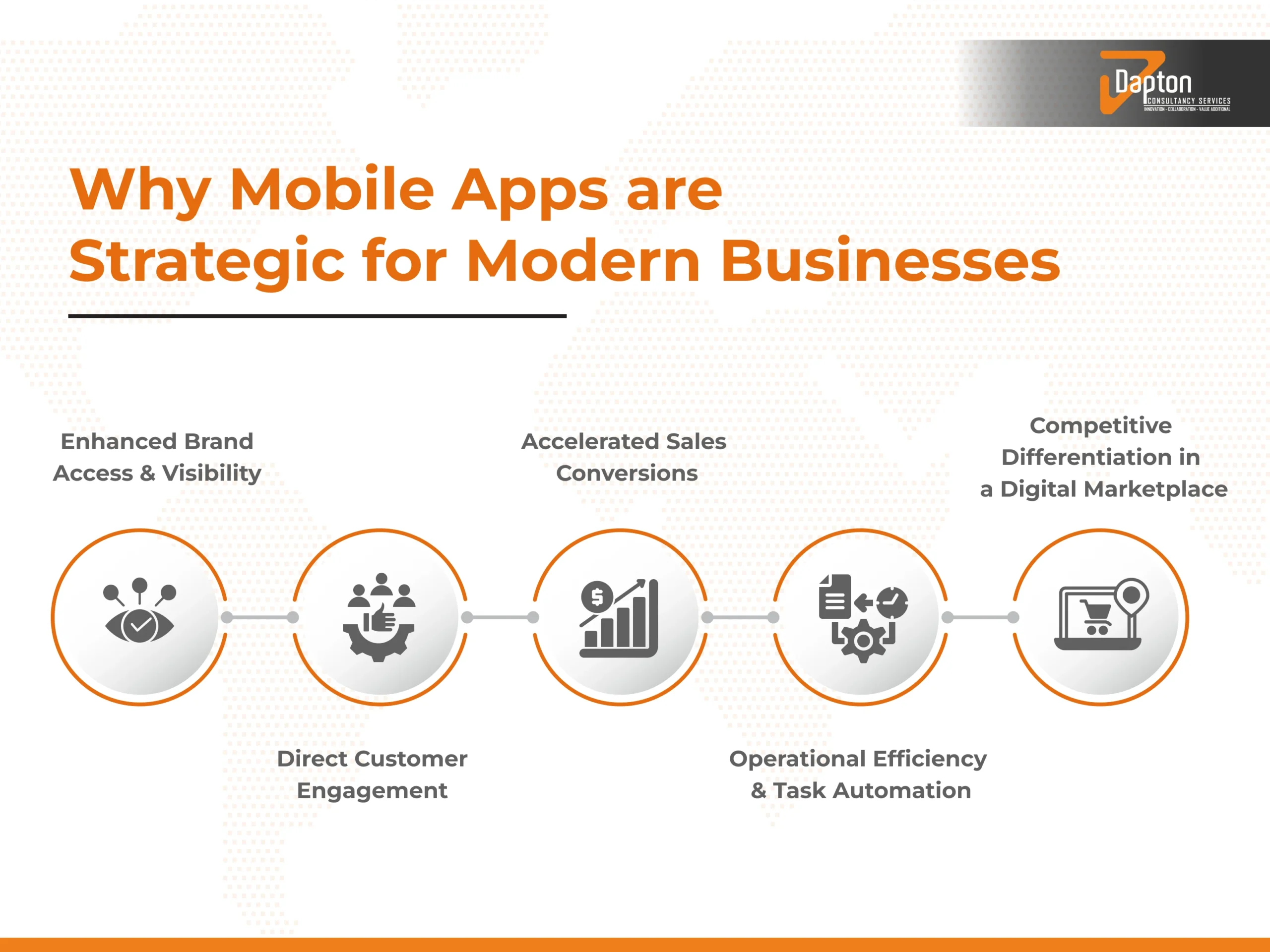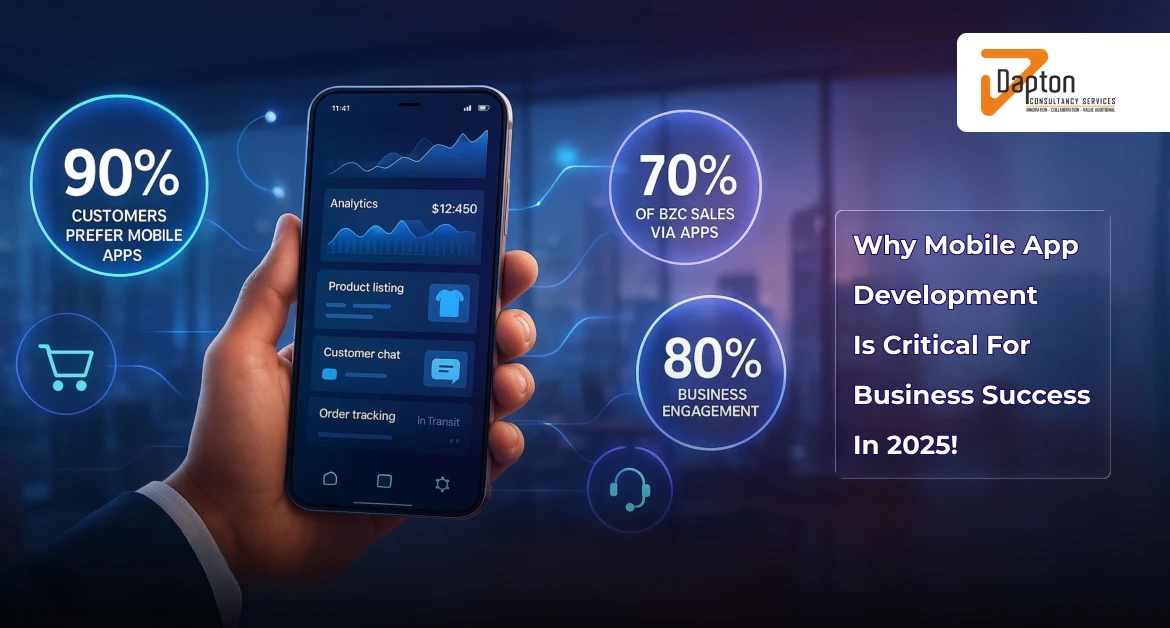In 2025, mobile app development is no longer a luxury – it is a strategic imperative. As digital ecosystems evolve, businesses must adapt to mobile-first consumer behavior. Whether you are a startup or an enterprise – understanding why mobile apps matter for business is key to staying competitive. So, partnering with a mobile app development company can be the difference between a fruitful project launch and an expensive failure.
The significance of mobile application development lies in its – capability to drive engagement. It even assists in streamlining operations and unlocks new revenue channels.
In short, mobile app development in 2025 is the cornerstone of business scalability and resilience. Let us further discover why mobile app development in 2025 is critical for your business operational success.
Why Mobile Apps are Strategic for Modern Businesses
Mobile apps are more than digital tools and are highly strategic assets. The substantial advantages of mobile app development for businesses extend across – branding, operations, and customer experience. It forms a robust and scalable mobile strategy for enterprises in 2025. Let us further explore the importance of mobile app development.

- Enhanced Brand Access & Visibility: Mobile apps offer 24/7 brand presence, increasing recall and customer loyalty. They further personalize user experiences and customer interactions.
- Direct Customer Engagement: Apps foster customer engagement with mobile apps through real-time communication. They also steer feedback loops and loyalty programs.
- Accelerated Sales Conversions: Integrated payment systems and intuitive UX design shorten the buyer journey. They boost conversion rates and drive revenue.
- Operational Efficiency & Task Automation: Mobile apps automate routine tasks – inventory tracking, scheduling, and reporting. They help in – freeing up resources for strategic planning.
- Competitive Differentiation in a Digital Marketplace: The importance of mobile app development lies in its capability to deliver unique value propositions. It helps businesses stand out in saturated markets.
Emerging Trends and Technologies in Mobile App Development!
Staying ahead means embracing mobile app trends that redefine how businesses operate and engage. Let us explore evolving trends and technologies for mobile app development in 2025.
Cross Platform Trends and Technologies:
Cross-platform app development enables – faster deployment and reduced costs. This makes mobile app development in 2025 more agile and scalable.
- Flutter:
Frameworks like Flutter have revolutionised the technology landscape. They enable swift cross-platform development from a single codebase. This makes Flutter ideal for startups and enterprises alike.
The importance of mobile app development lies in its ability to enhance – customer engagement and boost brand visibility. With mobile apps accounting for over 70% of digital media usage day, it is clear why mobile apps matter for business.
For enterprises, this means –
– Unmatched User Reachability – Deploy to both iOS and Android from a single codebase. It increases reach to global audiences.
– Customer Personalisation – It integrates easily with AI/ML models. And supports dynamic UI updates based on user behavior.
– High Conversion Potential – Fast load times and smooth animations improve user retention. Native-like performance boosts – engagement and in-app purchases.
- React Native:
Developed by Meta, React Native remains a leading cross-platform framework in 2025. It enables app developers to build high-performance mobile apps. It facilitates both – iOS and Android development using a -single JavaScript codebase.
The modular architecture of React Native enables native UI rendering, and robust community support. This scenario makes it a top choice for enterprise-grade solutions. It even highlights the importance of mobile app development.
For enterprises, this means –
– Faster development cycles – Through reusable components and feature-based structuring.
– Consistent user experiences – Steady across platforms with shared UI libraries and design systems.
– Improved maintainability – Enhancements via – localised state management and TypeScript integration.
– Streamlined collaboration – Easily linked across distributed teams due to – clear module boundaries and code benchmarks.
- Flutter:
AI App Features and Tools:
AI-driven apps offer – intelligent support, personalised recommendations, and voice-enabled interfaces for seamless user experiences.
- Chatbots:
AI-powered chatbots have evolved into essential tools. They enable -customer engagement, operational efficiency, and real-time support.
– 24/7 Availability – It handle queries round-the-clock with – instant responses, reducing wait times and support costs
– Natural Language Processing (NLP) – Understand user intent and context for more human-like conversations.
– Proactive Engagement – Initiate interactions based on user behavior like – reminders, promotions, or updates.
– Multilingual Support – It serves global audiences with – language adaptability and regional customisation.
– Integration with CRMs and Helpdesks – Seamlessly connect with enterprise systems for ticketing, lead generation, and analytics.
- Voice UIs:
AI-based Voice user interfaces (VUIs) drive user interactions with apps:
– Conversational AI – Enables natural dialogues using speech recognition.
– Accessibility – Empowers users with disabilities through voice commands.
– Multi-Modal Interaction – It supports – transitions between – voice, text, and visual interfaces.– Context Awareness – It understands – follow-up questions and adjusts responses based on user history or environment.
– Voice Commerce & Smart Assistants – They facilitate transactions, bookings, and automation in diverse domains.
- Chatbots:
AR/VR Integration:
AR/VR help in enhancing – product visualisation, training, and customer engagement.
– AR/VR in Retail – They are transforming shopping experiences by merging digital interactivity.
– AR/VR in Education – These technologies are – revolutionising how students – learn, interact, and retain knowledge.
– AR/VR Integration in Healthcare – Immersive technologies enhance product visualisation, training, and customer engagement in healthcare domains.
Advanced Security & Privacy Standards:
With rising data concerns apps now integrate – biometric authentication, end-to-end encryption, and compliant frameworks.
– Biometric authentication comprises – fingerprint and facial recognition.
– End-to-end encryption protects data in – transit and at rest. It safeguards digital communications and interactions.
– Mobile app platforms are aligning with – global compliance standards like GDPR, HIPAA, and ISO/IEC 27001.
When Businesses Should Build a Custom App!
Custom app development becomes a strategic imperative when off-the-shelf solutions fall short of meeting specific business goals. Unlike generic platforms, custom apps are designed from the ground up to align with a company’s operational model.
Custom applications are even more sync to brand identity and long-term vision. Let us further explore – why mobile apps matter for business.
Use Cases & Industry Examples!:
Custom mobile applications are designed to solve niche problems with precision and scalability. In healthcare, custom apps streamline appointment booking, patient record management, and telemedicine consultations.Logistics firms rely on tailored platforms for real-time fleet tracking. This enables – faster deliveries and reduced operational costs.
Cost vs Subscription Trade-offs!:
SaaS platforms offer – quick deployment, predictable pricing, and minimal upfront investment. However, they come with – limitations in customisation, scalability, and long-term control.In contrast, custom mobile app development—though requiring a higher initial investment — delivers greater strategic value over time.
With custom apps, businesses gain full ownership of the codebase, data architecture, and user experience. This allows for – deeper integrations and the flexibility to design personalised workflows.
How to Measure ROI on Mobile Development
Measuring business mobile app ROI is essential to justify investment and optimise performance. According to a study by Statista, global app store spending is projected to reach $185 billion by 2025, emphasizing the financial potential of mobile apps.
Let us further discover in detail – why mobile apps matter for business.
User Retention:
User retention via mobile apps reflects long-term value and customer satisfaction. High retention rates indicate that – users find consistent value in the app. The average social app has a 24 month usage retention rate of around 8.7 percent.This scenario reduces churn and lowers acquisition costs. Strategies such as onboarding optimisation and loyalty programs enhance retention over time.
User Engagement:
Push notifications for engagement boost interaction rates. It keeps users informed and active within the app. Beyond push notifications, engagement can be amplified through in-app messaging, gamification, and personalized content feeds.Using app gamification as user engagement strategies result in 54 percent upsurge in trial usage. Tracking session length, frequency, and feature usage helps identify – what keeps users coming back.
LTV (Lifetime Value):
Understanding LTV enables businesses to – segment users by profitability, prioritise high-value cohorts, and optimise acquisition channels. It also informs pricing models, upsell strategies, and long-term product development. Around 50 percent of paying shopping app consumers buy several times within a 90 days time period.
Conversion Rate:
One of the mobile app performance benefits is user conversion rate. It tracks how effectively the app turns users into paying customers. As per UXCam data, retail applications installed to purchase conversion rate is around 1.38 percent.Improving conversion rates involves refining the user journey—from intuitive UI design to frictionless payment flows.A/B testing, behavioural analytics, and personalised offers can help identify and remove barriers to purchase.
Tips for Choosing the Right Mobile App Development Partner
It is important to clarify business objectives, target audience, and desired features before selecting the right mobile app development partner. You must even decide between native, hybrid, or cross-platform app development – based on your scalability and performance needs.
Technology Experience :
Look for mobile application development partners with proven expertise in native, hybrid, and cross-platform technology stacks.
- Native Development – Ideal for performance-critical applications, native apps are built specifically for iOS (Swift/Objective-C) or Android (Kotlin/Java).
- Hybrid Development – Hybrid apps – built using frameworks like Ionic or Cordova, combine web technologies (HTML, CSS, JavaScript) with native containers.
- Cross-Platform Frameworks – React Native and Flutter dominate this space, allowing developers to write once and deploy across platforms.
UX Design Focus :
Prioritise firms that emphasise intuitive design, accessibility, and user-centric workflows.
- Simplicity & Clarity – Interfaces should minimise cognitive load by using familiar patterns, clear navigation, and consistent visual language.
- Inclusive Design Principles – Ensure the product works for users of all abilities, ages, and backgrounds. This includes screen reader compatibility, keyboard navigation, and adaptable UI elements.
- Iterative Testing – Look for partners who conduct usability testing throughout the design cycle to refine based on real user feedback
Cross-platform Capability :
Ensure they can deliver consistent performance across iOS, Android, and web platforms.
- Efficiency & Scalability – Partners should leverage modern frameworks like – Flutter, React Native, or Xamarin to build apps. They can use a – single codebase and reduce development time across all these platforms.
- Framework Selection – The choice of framework should align with your performance goals, UI complexity, and long-term scalability. For example, Flutter excels in UI consistency, while React Native offers strong community support and native integration.
Support & Maintenance :
Post-launch support is critical for – updates, bug fixes, and feature enhancements.
- Bug Fixes – Timely resolution of issues—ranging from minor glitches to critical failures—is essential to maintain user trust and app stability.
- Security Patches – Regular updates to address vulnerabilities protect user data and ensure compliance with evolving privacy standards.
- Feature Enhancements – Continuous improvement based on user feedback and market trends keeps the app relevant and competitive.
Key Takeaways
In a mobile-first world, investing in enterprise app development is a -strategic move that future-proofs your business. From customer engagement to operational efficiency – mobile apps unlock transformative potential. Do not wait – start building your mobile strategy today and lead the digital frontier.
Enterprise mobile apps offer personalised experiences, real-time interactions, and seamless service delivery – boosting customer satisfaction and loyalty.
So, now we know why mobile apps matter for business. Partner with Dapton Consultancy Services to enable productivity and remove performance challenges through our custom mobile application development services.



